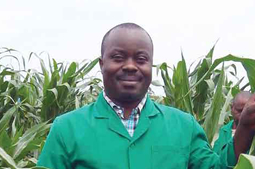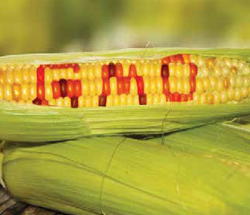What will I eat today’ vs. ‘will I eat today?’
 In reflecting on the second question, I have come to the conclusion that it is time for the public to put their trust in scientists about the role that genetically improved organisms can play in answering it.
In reflecting on the second question, I have come to the conclusion that it is time for the public to put their trust in scientists about the role that genetically improved organisms can play in answering it.
It’s sad that Africa continues to lag behind in the adoption of biotech crops 23 years after they were first commercialized. As of 2021, a total of 10 countries in Africa were growing GM crops, according to the International Service for the Acquisition of Agri-biotech Applications. They include South Africa, Burkina Faso, Egypt, Sudan, Mozambique, Niger, Ghana, Rwanda, Zambia, and Nigeria. The delay is especially tragic since there is more than enough evidence that biotech crop adoption could help tremendously in addressing the challenges of hunger and malnutrition globally.
In Africa, it is time we focus on diligent and accelerated regulatory regimes, as well as decisions based on science and the benefits of agricultural biotechnology. It is time we focus on agricultural productivity with an acknowledgement of environmental conservation and sustainability. It is time we give strong consideration to the millions of people who are hungry and impoverished across our continent and how modern agricultural biotechnology can help contribute to resolving these food insecurity challenges, instead of focusing on perceived risks and concerns that have never been backed with any evidence. Reluctance to adopt the technology is partly attributed to safety concerns, heightened by strong activism propagated from the west by countries that don’t face the same challenges that we do.
 Recently, in 2017, a team of scientists from Italy published an analysis detailing the potential impacts of genetically modified (GM) maize on the environment, agriculture and toxicity. The data generated over 20 years concluded that genetic engineering increased maize yields by 10 percent on average and reduced conventional mycotoxins in maize. This multiple data analysis provides very reliable evidence that GM maize can tackle a serious problem that has afflicted the continent for a long time – aflatoxin. Lower levels of natural mycotoxins, which are reported to be both poisonous and carcinogenic to humans and livestock, were observed in GM maize compared to its conventional counterpart. The study, like many before it, endorsed the safety of genetically modified organisms.
Recently, in 2017, a team of scientists from Italy published an analysis detailing the potential impacts of genetically modified (GM) maize on the environment, agriculture and toxicity. The data generated over 20 years concluded that genetic engineering increased maize yields by 10 percent on average and reduced conventional mycotoxins in maize. This multiple data analysis provides very reliable evidence that GM maize can tackle a serious problem that has afflicted the continent for a long time – aflatoxin. Lower levels of natural mycotoxins, which are reported to be both poisonous and carcinogenic to humans and livestock, were observed in GM maize compared to its conventional counterpart. The study, like many before it, endorsed the safety of genetically modified organisms.
In 2016, the US National Academy of Science published a report on GMOs which reinforced the scientific consensus that there is no substantial evidence that GM crops are less safe than non- GM crops. The question that lingers on my mind is this: How many studies will it take for our leaders to trust scientists? What is the scientist supposed to do beyond providing evidence that the technology works?
There is evidence, too, that “stacking” several GM traits in one crop is beneficial, resulting in yield increases of over 25 percent. In the same vein, no significant impacts have been observed on nontarget organisms and other beneficial organisms, including bees, ladybirds, beetles, lacewings and spiders. In previous data analyses, it has been documented that adoption of GMOs reduces the use chemical pesticides by about 37 percent compared to their conventional counterparts. Why then would our leaders want to get in the way of people enjoying such benefits, long after safety concerns have been put to bed?
Regardless of the scientific consensus and countless studies endorsing the safety of GM crops, there is widespread public perception that they are not safe. Worse still, some African governments have even hampered their production, only to allow imports of food and feed resulting from or containing GM products. This only benefits farmers in countries that have adopted the technology, while indirectly affecting our research progress, further delaying our access to improved seeds. This is a worrying trend in a continent viewed as the final frontier for agricultural transformation and bringing the massive numbers of unemployed youth into smart farming.
It is disheartening when those entrusted with the responsibility of making key decisions about this continent’s food and nutrition security continue to let half-truths impede them from taking decisive action. They shy away from making evidencebased decisions and developing facilitative policies that can enable this viable technology to blossom. Approximately two decades after the technology has proved itself both in terms of safety and delivery of socio-economic benefits, some of our leaders continue to hide behind precautionary measures and demand for “never-ending research.”
African leaders need to care about these studies and others that have endorsed the safety of GMOs and let credible scientific evidence guide them in decision making. In Africa, we have many collaborative initiatives on GM crops under various projects in many countries, and others that continue to face regulatory bottlenecks leading to significant lost opportunities for farmers and their families.
The narrative of “what will I eat today?” versus “will I eat today?” cannot continue. It is time African governments take action. We need products in the farmers’ fields and food on the table, and the time is now!
Mwimali Murenga, PhD, is a scientist in Kenya and a 2019 Cornell Alliance for Science Fellow. This email address is being protected from spambots. You need JavaScript enabled to view it.
Disclaimer: The views and opinions included in this opinion belong to the author and do not necessarily mirror the views and opinions of the employer.